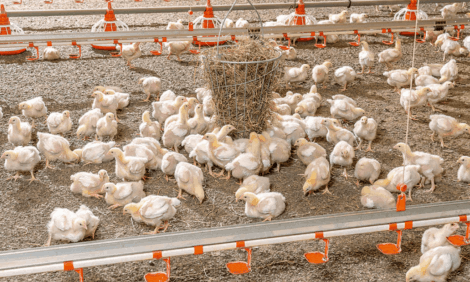



Mixture of Carvacrol, Cinnamaldehyde and Capsicum Oleoresin Improves Energy Utilisation and Growth of Broilers
In this UK study, plant extracts appeared to improve energy utilisation for growth in broilers although the Metabolisable Energy content of the diet was not affected.A mixture of carvacrol, cinnamaldehyde and capsicum oleoresin improved energy utilisation and growth performance of broiler chickens fed a maize-based diet, according to research by first-named author, D. Bravo of Pancosma SA in Switzerland.
In a paper co-authored by researchers at Harper Adams University in the UK and published in Journal of Animal Science, they explain that they used a total of 210, day-old Ross 308 male broiler chickens in an experiment to investigate the effects of a supplementary mixture containing five per cent carvacrol, three per cent cinnamaldehyde and two per cent capsicum on dietary energy utilisation and growth performance.
The two diets were offered ad libitum to the chickens from 0 to 21 days of age. These included a maize-based control diet and the control diet with 100g per tonne of supplementary plant extracts (XT; Pancosma SA).
Dietary apparent Metabolisable Energy (ME), nitrogen retention (NR) and fat digestibility (FD) coefficients were determined in the follow-up metabolism study between 21 and 24 days of age.
Feeding the plant extract mixture increased weight gain by 14.5 per cent (P=0.009), improved feed efficiency by 9.8 per cent (P=0.055) and tended to increase (P=0.062) carcass energy retention and reduce (P=0.062) total heat loss compared with feeding the control diet.
There was a 16.1 per cent increase (P=0.015) in carcass protein retention but no difference in carcass fat retention.
Feeding plant extracts improved dietary fat digestibility by 2.1 per cent (P=0.013) but did not influence dietary nitrogen retention.
Supplementation of plant extract resulted in a 12.5 per cent increase (P=0.021) in dietary Net Energy for Production (NEp), while no changes in dietary ME were observed.
The experiment showed that although dietary essential oils did not affect dietary ME, they caused an improvement in the utilisation of energy for growth, concluded Bravo and co-authors.
Plant extracts may affect metabolic utilisation of absorbed nutrients, they added, and studies that have focused solely on the effect of plant extracts on ME alone may well have not detected their full nutritional value.
Reference
Bravo D., V. Pirgozliev and S.P. Rose. 2014. A mixture of carvacrol, cinnamaldehyde, and capsicum oleoresin improves energy utilization and growth performance of broiler chickens fed maize-based diet. J. Anim. Sci. 92(4):1531-1536. doi: 10.2527/jas.2013-6244
April 2014











